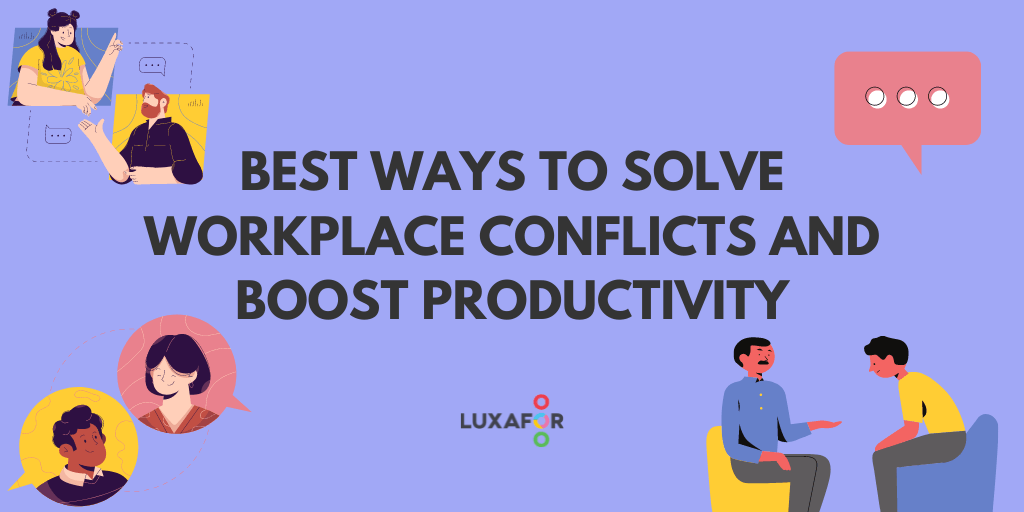Best Ways to Solve Workplace Conflicts and Boost Productivity
Wherever there are people living and working together, there is conflict, that is a truism. While conflict inevitably arises, it is how it is dealt with that speaks to the quality of a manager and the philosophy of an organization. Some managers possess superior diplomatic skills while others fumble conflict resolution and end up creating unproductive, hostile working environments. If you want to make sure you fall firmly outside the latter category, below are some of the best ways to solve workplace conflicts and ensure your team remains productive and high-performing, happy to work with one another and confident that their company will be there to help mediate disputes and achieve resolutions.
Incentivize Prosocial Behaviour
It is nice to be able to conveniently and diplomatically solve workplace conflicts, but it is even better if you can avoid them altogether. Conflicts take time to address and resolve, which can be a drain on productivity. One good way to avoid conflict is to create an environment in which it is easy for people to give and receive social capital from one another. An employee reward and peer recognition program is great for this because it gives coworkers opportunities to build positive relationships with one another based on mutual respect and recognition before any bad blood or conflict has a chance to arise.
Make Use of Arbitration
The ideal situation is one in which a conflict is resolved by the parties themselves, or with the help of the manager, but there are instances in which it becomes clear this is unlikely to happen. In the event of an impasse, you can always rely on an arbiter from elsewhere within the organization to help settle a dispute. This should be someone impartial who is willing to look at both sides of the story dispassionately and make an objective decision. You can even have dispute resolution as part of a contract employees sign when they are hired which asks them to agree to an arbitration process and accept its outcome.
Don’t Let Conflicts Fester
If you know something is simmering on your team or are aware it has come to a head, the best thing you can do is take immediate action. If you let a conflict fester, there is a good chance it will develop into something that requires arbitration or perhaps even HR’s involvement, which is not ideal for anyone. Employees should have it made clear to them that in order for the company to consider the conflict resolved, there must be a solution reached that both parties are amenable to.
Not only does letting a conflict spiral have a negative effect on those involved, but it creates an unpleasant working environment for everyone around the two parties. It might even end up affecting team productivity as people start looking for ways to avoid working with both of the conflicted parties at the same time in order to avoid awkwardness, which can result in inefficient and impractical working arrangements.
Be on the Side of the Company
In the event that you, as a manager, have to get involved and either adjudicate or help mediate the conflict, the best and fairest position you can take, unless one of the parties is clearly in the wrong, or perhaps even violating company rules and regulations, is to take the side of the company.
Taking the side of the company is to say you should avoid taking one employee’s side over another, even if you like one employee more than the other because favouritism and even the perception of it can be disastrous for morale and therefore productivity. Taking the side of the company and your team allows you to position your interests as neutral and, in the event you should need to, fall back on company and HR policy if you are not left with any alternatives.
Read About Conflict Resolution
Good managers of people understand that conflict is inevitable and set about preparing themselves for when it happens. Being a good conflict manager and diplomat is something we learn through experience but there is also a long list of classic conflict resolution books out there to read and incorporate into your management style.
There is an art to conflict resolution and getting better at it means both absorbing more information on the theory behind it and putting it into practice in real life. It is a good idea for organizations to make conflict resolution part of their leadership professional development initiatives so that any interpersonal conflicts or disagreements can be quickly addressed, solved and productivity kept on track.
Build Your Team
There is a wide range of reasons for workplace conflict, from work style conflict to personality clashes. Often coworkers clash with one another because they have not had the opportunity to spend time getting to know one another on an interpersonal and professional level. Assuming that all of the people you bring on board you do so for good reason, there should be nothing in either the personality or workstyle categories that is so glaring it is irreconcilable.
If you want to build tolerance and mutual respect on your team and create leeway for people of different styles and personalities to get on and work harmoniously, you have to give them opportunities to build trust and respect, either in or outside of work. This could be through luncheons and after work get-togethers that allow people to interact in informal settings and/or case studies and other in and outside of work team building events that provide people with the chance to work together and rely on one another.
Conclusion
No group of people is ever completely free of conflict forever. There will come a time when you, as a manager, need to get involved or request that someone else does to help settle disputes between coworkers. The disputes could be small or large, serious or simple misunderstandings, but the bottom line is that part of people management involves managing and helping them overcome and accept their differences. Keep the above workplace conflict resolution methods in mind and make sure your team stays happy, harmonious and high-performing all that time.
Do you want to build and maintain new habits? Get your free PDF version of the Don't Break The Chain calendar and start today!
Do you want to build and maintain new habits? Get your free PDF version of the Don't Break The Chain calendar and start today!
Author's Bio
Chris Delgado is a renowned author, who is learning psychology. He loves reading and spending time writing. Apart from writing, he loves trekking and enjoys yoga sessions.















